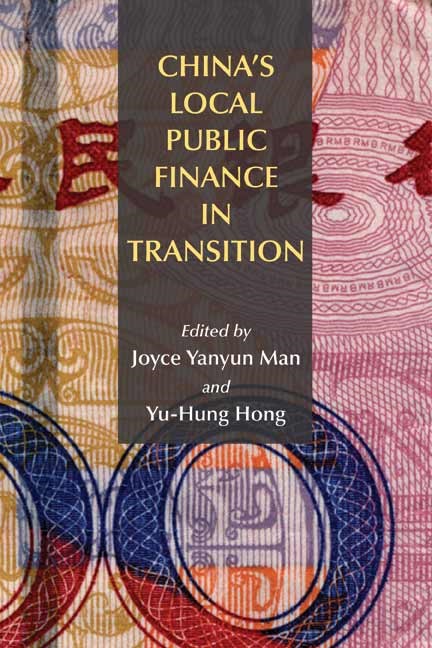| China’s economy has developed rapidly
following the 1978 implementation of economic reforms that
facilitated investment, expanded trade, and introduced market
mechanisms and practices. However, reforms of China’s public
finances have proceeded more slowly and with less publicity. The
major reform (a tax sharing system) implemented in 1994 shifted a
large share of fiscal revenues from local governments to the
central government, but did not substantially reassign expenditure
responsibilities back to the center. Following the 1994 reform,
local governments had 46 percent of revenues but responsibility for
77 percent of public expenditures.
This revenue shortfall motivated local governments to exploit
new sources, and revenue from the conversion of land from rural to
urban use has been one of the most important extra-budgetary
sources. Conversion involves compensating farmers for their land
based on its agricultural use value, and then converting the land
to urban use and selling it for development at a much higher value.
The difference in land values accrues to the local government.
The revenue from land sales has been a major source of funding
for investment in infrastructure capital, often required to provide
services to the newly converted urban land. In areas where urban
land is in short supply revenues have been significant, and the
incentive to produce more revenue has led to excessive land
conversions. This practice has created low-density development in
the periphery of some metropolitan areas while leaving large areas
of urbanized land undeveloped.
Three major policy options explored in this volume can address
the underlying imbalance between revenues and expenditures at the
local level in China: (1) institute new sources of local revenue,
such as a property tax; (2) reform and enhance revenue transfers
from the central government to local governments, a promising
approach that could also address cross-provincial disparities; and
(3) revisit the assignment of expenditure responsibilities from
local governments to the central government to align revenues and
expenditures at the same level. The end result is likely to be a
mix of all three options as part of an incremental reform.
This book presents the proceedings of a conference cosponsored
by the Lincoln Institute and the Peking University–Lincoln
Institute Center for Urban Development and Land Policy in May 2008,
plus two additional chapters. It will be a valuable resource for
government officials, public finance practitioners, academic
researchers, university faculty and students, and others concerned
with government tax and expenditure policies and practices in
China. This volume will be translated into Chinese and published in
association with the Peking–Lincoln Center in Beijing.
Contents
Foreword, Gregory K. Ingram
Introduction
1 Local Public Finance in China: An Overview, Joyce Yanyun
Man
Local Expenditures
2 Assessing the Assignment of Expenditure Responsibilities,
Jorge Martinez-Vazquez and Baoyun Qiao
3 Fiscal Decentralization, Infrastructure Financing, and
Regional Disparity, Weiping Wu
4 Financing Local Public Infrastructure: Guangdong Province,
John L. Mikesell, Jun Ma, Alfred Tat-Kei Ho, and Meili Niu
Local Revenue Sources
5 Provincial Tax Revenue, Donald J. S. Brean
6 Tax Structure and Economic Growth, Joyce Yanyun Man and Xinye
Zheng
7 Fiscal Reform and Land Public Finance: Zouping County in
National Context, Susan H. Whiting
8 The Path to Property Taxation, John E. Anderson
9 Integrating the Proposed Property Tax with the Public
Leasehold System, Yu-Hung Hong and Diana Brubaker
Intergovernmental Transfers
10 The Determinants of Intergovernmental Transfer, Li Zhang and
Xinye Zheng
11 Central Government Transfers: For Equity or for Growth?,
Shuanglin Lin
12 Fiscal Reform and Rural Public Finance, Richard Bird, Loren
Brandt, Scott Rozelle, and Linxiu Zhang
Future Reform
13 Intergovernmental Fiscal Relations and Local Public Finance:
What Is Next on the
Reform Agenda?, Roy W. Bahl
About the Editors
Joyce Yanyun Man is senior fellow and director of the Program on
the People’s Republic of China at the Lincoln Institute and
director of the Peking University–Lincoln Institute Center for
Urban Development and Land Policy in Beijing. Contact:
Yu-Hung Hong is senior fellow in Interdepartmental Programs at
the Lincoln Institute and visiting assistant professor in the
Department of Urban Studies and Planning at the Massachusetts
Institute of Technology. Contact:
China’s Local Public Finance in Transition
Edited by Joyce Yanyun Man and Yu-Hung Hong
2010 / 300 pages / Paper / $30.00 /
ISBN: 978-1-55844-201-6
Ordering information
Contact Lincoln Institute at
|


 京公网安备 11010502034662号
京公网安备 11010502034662号 